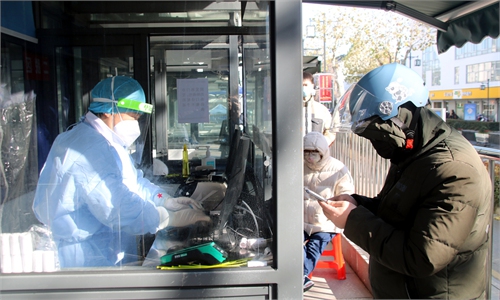Yinchuan authorities apologize for police officers' 'inappropriate manner' in anti-epidemic work

Aerial photo taken on Nov. 6, 2021 shows a snow scene in Yinchuan, northwest China's Ningxia Hui Autonomous Region. Yinchuan witnessed the first snowfall this winter Saturday.Photo:Xinhua
Authorities in Yinchuan, Northwest China's Ningxia Hui Autonomous Region issued a statement on Tuesday night, apologizing for the inappropriate manner that some police officers showed in anti-epidemic work, which has triggered heated discussion online in recent days.
The law enforcement officers involved have made apologies, and the incident will be dealt with seriously after an investigation, according to the statement.
The statement came after a viral video circulated on the Chinese internet on Tuesday showing three people frisking a man, with one of them wearing a blue vest knocking the person being frisked to the ground and then kneeling on him.
The video quickly drew outrage from netizens, who linked it to other recent misconducts against residents in the context of anti-epidemic work. Netizens called on local authorities where the incident occurred to offer an explanation.
On Tuesday night, authorities in Yinchuan's Xingqing district issued a statement, which restored the whole incident. It said on October 28, a market in Yinchuan was designated as a high-risk area due to a cluster of COVID-19 infections. The man who was frisked, surnamed Peng, was transferred to the hotel as a close contact for centralized quarantine.
On the morning of November 1, Peng violated the quarantine rules by leaving his room and going downstairs before rushing out the back door of the hotel without permission. After noticing the getaway, the police officers on duty chased and stopped Peng.
At that time, Peng claimed that he had been suffering from mental illness. He was also very emotional and had his hands in his pockets. To prevent him from carrying dangerous items and causing social harm, the police officers searched him and sent him back to his room, according to the statement.
On the evening of November 1, a staff member accompanied Peng to the hospital for a medical consultation, where he was diagnosed with a mental disorder, but no physical impairment. The staff member purchased medication for him. On November 4, Peng was released from quarantine.
The man in the video wearing a blue vest who was seen searching and kneeling down on Peng in an apparent aggressive manner is a local police officer who was responsible for maintaining order at the site. The other two uniformed personnel were a police officer and an auxiliary police officer, the statement said.
The officers have since made a face-to-face apology to Peng.
Yinchuan authorities said relevant departments have set up a team to investigate the incident, and will deal with the matter seriously in accordance with the law.
The authorities apologized for the adverse social impact caused by the incident and said they would learn a lesson, and follow the principle of “people first” and improve the level of public service in the future.
Chinese observers said the incident has once again exposed the problem of enforcement capacity that exists in grassroots-level management and the case is expected to be an opportunity for the country to enhance grassroots officials’ law enforcement capabilities.
Acknowledging that the local government's response to the matter is timely, Zhang Yiwu, a professor at Peking University, told the Global Times on Tuesday that more regulations could be established to improve the law enforcement capacity at the grassroots level, such as recording the process of law enforcement.
There are some problems at grassroots level, which require improvement in the future, but more understanding from the public is also needed, Zhang said.
In 2020, China's Ministry of Justice issued a document explicitly requiring adherence to civilized law enforcement. In particular, the ministry mentioned that law enforcement officers should "pay attention to language and behavior, eliminate brutal or rigid law enforcement, avoid intensifying conflicts and causing confrontation," and "fully consider the public emotion during the epidemic prevention and control work."
The Legal Affairs Committee of the Standing Committee of the National People's Congress also stated that there should never be "violent law enforcement" or "excessive law enforcement" in anti-epidemic work. The means of law enforcement officers need to be procedural and rationalized, and the principle of proportionality should not be used to deal with the general public in the same way as illegal crimes, otherwise it will not only defeat the original purpose of epidemic prevention and control, but also damage the confidence of the public.
Observers stressed that “people and their lives come first” should be the starting point as well as the ultimate goal of China's epidemic prevention policy.

